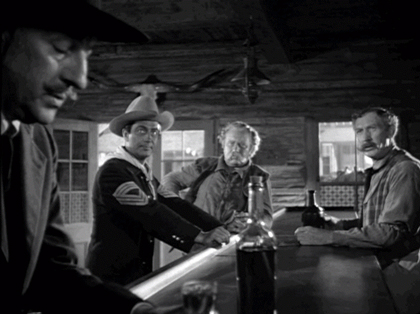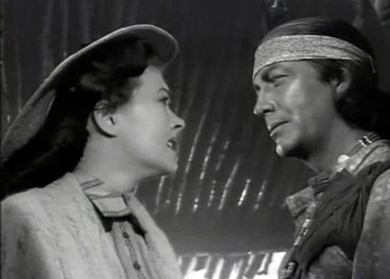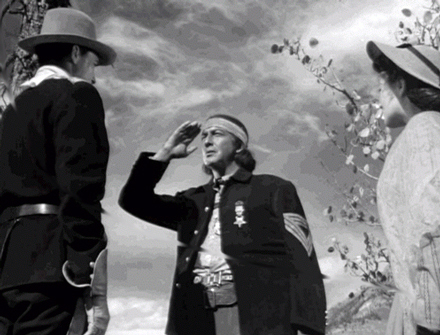
 |
|
|
|
Now known mostly as a maker of James Stewart westerns, and as "the guy that Kirk Douglas fired from Spartacus", Anthony Mann was one of filmdom's most respected directors. Before graduating to bloated '60s epics Mann began as a lowly contract director in the 'B' film trenches. His breakthrough came with the success of his Eagle-Lion production T-Men, a tough-talking undercover noir packed with intrigue and ruthless violence. MGM called, and from that point forward Mann was a name in demand. His films were admired and respected by audiences, critics, and his industry peers. 
Presumably encouraged by MGM chief Dore Schary, Mann made two very capable additions to the briefly hot "social conscience" trend that would soon be stifled by government inquisitions and industry blacklisting. The impressive, violent Border Incident takes up the cause of victimized transient farm workers smuggled across the Mexican/American border. Mann's Devils' Doorway is an even more emphatic indictment, reaching further back in history to refute cultural assumptions about Native Americans. Western films habitually faulted uncaring politicians and greedy Indian agents for the cruelties visited on pacified Indian tribes. Drawing from historical fact, Guy Trosper's screenplay directly condemns governmental policy as a thieving conspiracy to dispossess Indians of their property and remove them to "protective reservations". In the 1970s we thought that pictures like Arthur Penn's Little Big Man were groundbreaking exposés of these historical crimes. Mainstream Hollywood had tackled the same issues a generation previously, only to find that viewers tired of message films, and that repressive political elements didn't want the stories told. One of Mann's better noir efforts was Raw Deal, a title that could well describe the storyline of Devils' Doorway. Returning home at the conclusion of the Civil War, decorated veteran and rancher Lance Poole finds that things have changed in Medicine Bow, Wyoming. A Shoshone Indian by birth, Lance has adopted many of the White Man's customs. Lance does well with his beef sales and anticipates a rosy future, as his coveted Sweet Meadow ranch high above Medicine Bow is excellent grazing territory. But new federal laws enacted to 'resolve the Native American problem" have arbitrarily classified Indians as wards of the state, not American citizens. Local tribes are booted from their traditional land and shipped off to reservations. The opportunistic lawyer Verne Coolan (Louis Calhern) declares that Lance owns nothing and intends to force him. He's solicited money from dozens of sheep men, promising to guide them to good grazing land - Lance's Sweet Meadow. Coolan's racist remarks have inflamed racial prejudice in Medicine Bow against Lance, whose good friend the Sheriff Zeke Carmody (Edgar Buchanan) now desert him as well. Concerned attorney Orrie Masters (Paula Raymond of The Beast from 20,000 Fathoms) takes Lance's side, only to discover that "the fix is in" - the authorities ignore the Indian's petitions to homestead his own land. Under the law Lance is not a citizen and has no legal rights; he doesn't exist. When Lance refuses to budge, Verne Coolan goads the shepherds into storming the meadow, knowing that the Army will interpret any violence as an "Indian uprising". Lance has only two choices -- to accept gross injustice and humiliation, or see his ranch and fellow tribesmen wiped out. Devils' Doorway may be a western, but its outrage against prejudice and profiteering is clearly meant to have contemporary relevance. Only two years earlier, star Robert Taylor had testified before the HUAC that subversive anti-American ideas were being slipped into Hollywood entertainment. Any actor committed to a political position would realize that the script for Devils' Doorway blames American capitalism and race prejudice for the crimes against the noble Red Man. Verne Cooley's mob gives Lance Poole little choice but to become an outlaw-terrorist. The rush to violence quickly overshadows hints of mutual romantic yearning between Lance and Orrie Masters. Robert Taylor surely took the part for the same reason any actor would -- it's an excellent role, and remains one of his most impressive performances. 
The screenplay by Guy Trosper doesn't compromise with its content. Other movies showing Native Americans being subjected to unfair treatment (Fort Apache) blamed isolated "bad apple" traders for cheating the Indians with bad rations, or (more frequently) selling them weapons with which to rebel. Doorway's opportunistic Verne Coolan is a supremely loathsome villain, but Doorway also observes that the majority of Americans flowing into the West consider Native Americans a pestilence to be swept aside. The first step is malicious discrimination. A doctor ignores Lance's pleas for medical help for his ailing father (Fritz Leiber). Verne Coolan begins his harassment of Lance right in the barroom, through a local ordinance that forbids Indians from buying drinks. Four years before, John Ford gave Henry Fonda's remark in My Darling Clementine a humorous spin: "What kinda town is this, sellin' liquor to Indians?" In western movie terms, a man forbidden to drink in a bar is by definition not a real man. The inevitability of violent struggle is Devil's Doorway's most subversive aspect. Most dramas about the fate of Native Americans are pessimistic tragedies, the difference here being that Lance Poole fights back. His rebellion is joined by a small band of dispossessed Shoshone holdouts. Anthony Mann dwells on violent scenes of Lance and his warriors shooting and stabbing members of Cooley's posse. Lance is even shown strangling one enemy in a bloodthirsty rage. Lance's ranch house becomes a battlefield. Verne Cooley's private vigilante army is reinforced by the U.S. Cavalry, just as in Michael Cimino's Heaven's Gate, thirty years later. Robert Taylor is unexpectedly convincing as the proud Shoshone war veteran, whose heart hardens as his former friends and neighbors abandon him. Louis Calhern truly odious Cooley easily manipulates Edgar Buchanan's weak lawman and Marshall Thompson's pliable sheep man. Spring Byington is a local matron who learns that the Shoshones pose no credible threat to their neighbors. James Mitchell is Lance's warrior aide, Red Rock; he had played a migrant farm worker in Mann's Border Incident. Paula Raymond's frontier attorney could easily have come off as a foolish idealist, but is wisely written as Lance Poole's only friend in the conflict. Loyal to a fault, Orrie keeps angling for a peaceful solution to an irreconcilable problem. We know that no authority is going to side with Lance, the righteous martyr. Anthony Mann's beautiful direction makes a feast of glorious locations filmed in Colorado's Aspen and Grand Junction by the legendary cinematographer John Alton. Every close-up is given expressive character lighting, and the outdoor vistas are carefully chosen to contribute to the film's darkening mood. Medicine Bow's saloon begins as a friendly haven, but through Verne Coolan's influence it is transformed into a sea of hostile faces. Mann's forceful blocking frequently ties close-ups together with action backgrounds, eliminating the feeling of standard coverage cutaways. When the blacklist forced prominent leftist directors like Joseph Losey, Cy Endfield and Jules Dassin into exile in Europe, socially critical films like The Prowler, The Underworld Story and Devils' Doorway disappeared from American screens. The studios opted for non-controversial subject matter. The 1950 movie now remembered as a pro-Native American epic is Fox's Broken Arrow, an "Apaches are people too" romantic semi-remake of the Polynesian tragedy Bird of Paradise. Frontier scout James Stewart marries Apache maiden Debra Paget. But the archaic Production Code did not permit the depiction of mixed marriages. Instead of jumping into a volcano, Paget's princess is sacrificed to bring tribal peace. Broken Arrow's audience-reassuring conservatism is the opposite of the liberal moral outrage of Devil's Doorway. 
Anthony Mann's subsequent films fell into line with the conformist '50s, especially those made in partnership with James Stewart. The team's westerns are of a high artistic quality, but they dropped all social comment in favor of simplistic moralizing. The Stewart-Mann Thunder Bay promotes and defends the oil industry's drilling in costal waters, dismissing the 'uninformed' concerns of fishermen and ecologists. 
The Warner Archive Collection DVD-R of Devils' Doorway is a beautiful transfer of this stunning show. John Alton's talent wasn't limited to low-key noir moods, as his B&W cinematography here is so good that we never wish the film were in color. The sound is excellent as well, with Danielle Amfitheatrof's busy music score matching the film's dark themes. (If only Amfitheatrof's music for his later Major Dundee were as carefully crafted...) The WAC's trailer indicates that MGM's studio publicists considered social relevance to be a promotional liability. The trailer uses every shot available of Robert Taylor when he's not in Shoshone garb. The film's grim storyline isn't even hinted at, while a repeated text tagline assures us that the show is, "a Great Drama of Flaming Frontiers!"
On a scale of Excellent, Good, Fair, and Poor,
Devils' Doorway rates:
Reviews on the Savant main site have additional credits information and are often updated and annotated with reader input and graphics. Also, don't forget the 2011 Savant Wish List. T'was Ever Thus.
Review Staff | About DVD Talk | Newsletter Subscribe | Join DVD Talk Forum |
| ||||||||||||||||||